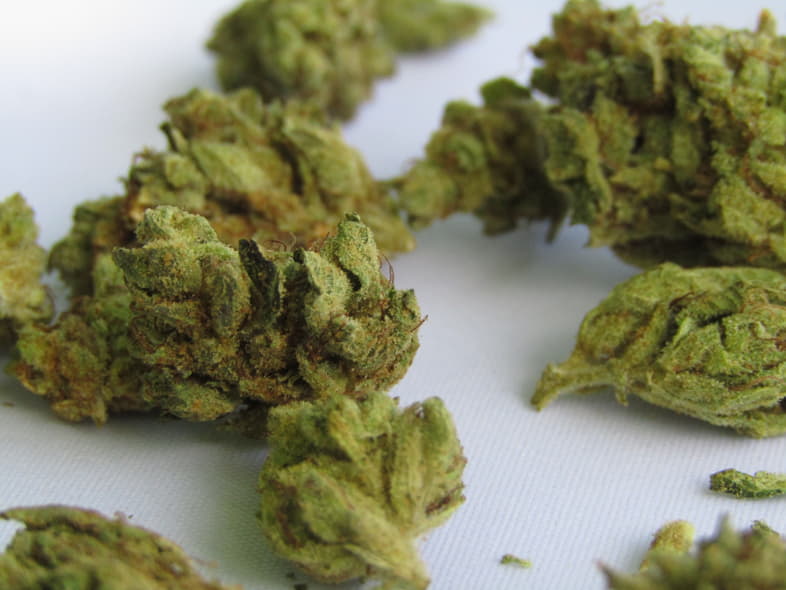Modified on: 09/01/2024
Limonene terpene: let’s see together essential oils with natural aromas
Cannabis has long been at the centre of heated debates because of its – so to speak – dual personality: on the one hand, a narcotic substance, and on the other, a medicinal plant, which legal version is used to produce CBD oil for medical and pharmacological industries.
Regardless of which thesis is the most popular, recent scientific discoveries are increasingly confirming its components’ diverse beneficial potential.
These include limonene, a terpene contained in relatively high concentrations.
But what exactly is it? What are its properties?
This article will tell you about limonene and the scientific evidence confirming its therapeutic properties.
Read also: Rastafarianism: principles and customs of this too-often misunderstood religion
What is limonene?
It is well known that cannabis contains numerous elements, such as flavonoids, cannabinoids and terpenes. The latter include limonene, the terpene in the highest concentration of all the others, right after myrcene.
As you may guess from the name, limonene is contained in the peel of lemons, oranges and citrus fruits in general and is responsible for their classic aroma.


But citrus fruits are not the only vegetables in which we can find them. Juniper also contains it, as do mint, pine needles and rosemary.
Limonene is a highly volatile monoterpene, making it particularly useful in warding off pests that can smell it even from far away. In addition, its pungent aroma is perceived by insects as potentially toxic and therefore discourages them from approaching and protecting the plant.
Although limonene is one of the most common terpenes in most cannabis strains (such as CBD weed strains), this does not necessarily mean that all have a recognisable lemon scent. In fact, in many cases, the aroma released is more reminiscent of the smell of tangerine or grapefruit.
According to studies conducted on the entourage effect, limonene can also contribute to triggering the famous synergy that allows the different components of cannabis to be more potent when taken simultaneously.
In addition, limonene appears to be able to increase cell permeability, thereby enhancing the body’s absorption of other substances as well.
A further point in its favour is its very low level of toxicity, almost nil. As a result, it is practically impossible to experience any side effects from its intake except to the skin or respiratory system. However, limonene can irritate the skin or lungs, and symptoms of such discomfort are usually limited to vasodilation and lacrimation.
Although it may be irritating for a minority of people, in the majority of cases, it could be used successfully in the treatment of some particular form of bronchitis.
Many also claim that limonene gives cannabis smoke or vapour a fresher, more intoxicating taste and enhances its beneficial effects.
Read also: Some say that zinc helps remove THC from the body. What is the truth?
Limonene Hash Oil: Citrus Fruits for CBD Essential Oil
Limonene hash oil, derived from citrus fruits, has gained significant attention for its potential in producing CBD essential oil. This innovative extraction method utilizes the abundant terpene limonene, commonly found in the cannabis plant, to enhance the therapeutic effects of the final product. In this text, we will explore the process of extracting essential oils from cannabis strains, emphasizing the role of limonene terpene and its impact on the quality and therapeutic benefits of CBD essential oil.
Extraction Methods
The extraction process involves ultrasound-assisted extraction, a method known for its efficiency in obtaining essential oils from plant material. This technique is particularly effective in preserving the delicate balance of cannabinoids and terpenes, including the prevalent terpene limonene. Unlike common solvents, ultrasound-assisted extraction ensures the extraction of essential oils without compromising their chemical profile.
Limonene Terpene and Cannabis Terpenes
Limonene, a fragrant oil found in fruit rinds and cannabis plants, occurs naturally and contributes to the terpene mode of cannabis strains. The limonene vapor obtained through this extraction method holds therapeutic benefits, including anti-inflammatory and antioxidant properties. The presence of limonene, along with other terpenes, creates a potential cannabis synergy, known as the entourage effect, enhancing the overall therapeutic effects of the final product.
Therapeutic Effects and Potential Cannabis Synergy
Studies suggest that limonene, when combined with cannabinoids like CBD, may have anti-anxiety and sedative effects. The entourage effect, resulting from the interaction of various cannabinoids and terpenes, may play a crucial role in taming THC’s psychoactive effects and directly affecting brain cells. This synergy has implications for medical cannabis, as it opens avenues for well-defined brain targets and innovative methods of utilizing cannabis compounds for therapeutic purposes.
Quality Control and Future Research
Maintaining a high-quality product requires a stringent filtration system to remove impurities and ensure the desired terpene profile. This process is crucial for producing CBD essential oil with consistent anti-inflammatory benefits and antioxidant effects. Ongoing and future research aims to explore the potential of limonene hash oil, specifically its impact on immune function, serotonin and dopamine levels, and its role in the endocannabinoid system.
But what, in more detail, are the benefits of limonene?
As far as scientific research on the properties of limonene is concerned, we must say that it has not yet been completed.
The main areas of application, and those we have the most certainty, concern its now confirmed anxiolytic, antibacterial, antitumour, immunostimulant and antidepressant properties.
In addition, limonene seems to be effective in combating gastric problems, such as ulcers. It inhibits the proliferation and spread of cancer cells, especially in cases of breast cancer, as we will go into later.
In addition, limonene appears to have the ability to increase cell permeability, allowing for more excellent absorption of consumed substances, such as the cannabinoids in marijuana and hashish.
Limonene is among the most common natural pesticides in the animal and plant world. Its pungent scent scares away pests that avoid approaching certain plants.
Also, due to its intense fragrance, limonene is used in the cosmetics industry and produces detergents and air fresheners.
Returning to cannabis, this fragrant terpene influences flavour and aroma, even intensifying the therapeutic and potentially energising effects of several marijuana strains.


But are there any scientific studies on limonene? Yes, here are a few
The first thing to say is that limonene has never been considered a narcotic, even though it is contained in cannabis. And for this reason, researchers have enjoyed a certain amount of freedom during in-depth analyses of its characteristics.
The main potential of this fragrant terpene relates to its previously mentioned therapeutic properties, but not only.
It seems that in one group of volunteers, levels of attention, concentration, libido and well-being increased considerably following the intake of limonene.
But most studies, for the time being, focus on its anti-cancer properties.
In 2011, a study conducted at the University of Arizona published in the journal ‘Oncology Reviews’ showed that limonene could modulate our immune system with anti-cancer consequences.
Then, in 2013, another research conducted by the same university and published in ‘Cancer Prevention Research‘ stated that limonene inhibits the proliferation of cancer cells, also reducing tumour size. The tests were conducted on a sample of about 40 women diagnosed with breast cancer.
A few months later, further encouraging confirmation arrived.
In another study, conducted in 2014 in France and published in the journal ‘Anti-inflammatory and Anti-allergy Agents in Medicinal Chemistry’, it was shown that limonene possesses essential anti-inflammatory properties that may prove very useful in the treatment of certain forms of cancer.
According to this study, this terpene can prevent cancer from progressing by inhibiting the ability to surround tissues to create new blood vessels.
Finally, according to further research, limonene can regenerate damaged cellular tissue, providing new therapeutic alternatives in the treatment of skin rashes.
In conclusion, what are the properties of limonene?
Limonene is one of the significant terpenes contained in cannabis, second only to myrcene.
Its main characteristic is its intense citrus scent, typical of lemons, oranges, tangerines and grapefruits. But that is not all. Limonene is also found in other plants that are not precisely citrus fruits. It is the case with mint, rosemary, juniper and pine, particularly its needles.
Thanks to its intense and aromatic fragrance, limonene can be intercepted by many insects and pests from considerable distances and has a beneficial natural anti-parasitic effect.
Furthermore, scientific studies over the past decade have confirmed several therapeutic properties consistent with many other cannabis components.
Mainly we speak of anti-cancer effects, especially in cases of breast cancer, and antidepressant, antibacterial, anti-inflammatory and immune system stimulating potential.
If cannabis fascinates you, I recommend you look at our website Justbob.shop where you can find the best varieties of CBD cannabis.
We are waiting for you in our CBD flower shop!








